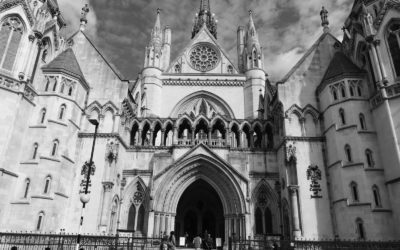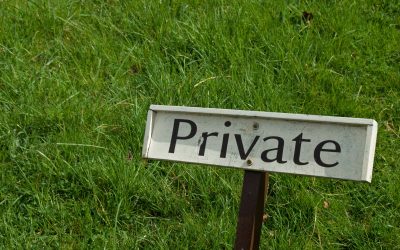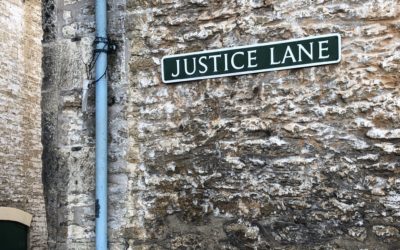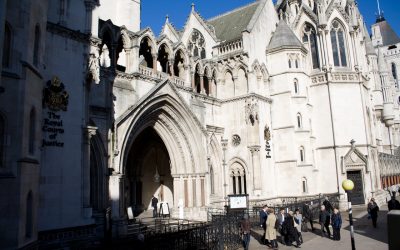Legal Blogging and the Open Reporting Provisions
This page contains information about the legal bloggers scheme set out in Family Procedure Rule 27.11 and Practice Direction 27B, and the Open Reporting provisions contained in Practice Direction 12R (Effective from 27 January 2025, formerly the ‘Reporting Pilot’).
Under FPR 27.11, ‘duly authorised’ lawyers who are not involved in the case are entitled to attend most private family court hearings . These are ‘legal bloggers’. Rule 27.11 also gives journalists (‘accredited media’) the right to attend hearings in the family court.
Legal bloggers are not professional journalists, but are performing a journalistic or public legal educational role. Most legal bloggers are associated with The Transparency Project (that’s us), and are unpaid. We publish our reports on this site (scroll down) and occasionally elsewhere. We explain a little about the introduction of legal bloggers rights, and how they came about here.
Under the open reporting provisions, when a journalist or legal blogger attends a hearing, a ‘Transparency Order’ will usually be made, to allow them to report on an anonymised basis. The open reporting provisions apply to most cases about children. There are a few transitional provisions about which cases are covered in some courts, over the next few months (see below).
In cases about financial remedies, there is a separate pilot scheme, which operates in a similar way to the open reporting provisions, allowing reporters to write about cases with limited restrictions (around identification and commercially or financially sensitive information). There is more information about this in the FAQ below.
Further down this page you will find answers to Frequently Asked Questions, and below that a list of our legal blogging posts.
Download our guidance note – What to do if a reporter attends (or wants to attend) my hearing HERE. We produced this guidance note to help lawyers and judges in cases attended by legal bloggers or journalists. We updated it in September 2025 to reflect the introduction of PD12R. You might find it helpful to refer to or to signpost lawyers and judges to.
FAQs
Can you send a journalist to my hearing?
The Transparency Project is an educational charity and whilst we work with journalists we do not send journalists to court. We do send our legal bloggers to court as reporters (see below).
Can your legal bloggers attend my hearing? What information should I send you?
We are often invited by some parties to attend their hearings. Sometimes these requests will be from litigants who are unhappy about their case and how it has been handled, worried about how it might be handled, or who want the issues in their case to be brought to a wider audience. Our approach to these requests is as follows :
Please don’t send us court documents or lots of detail about your case in the hope we will attend court. There are strict rules about what you are allowed to share with us and we don’t want you to be criticised for sharing information that you shouldn’t have shared. If a transparency order has been made, there are some documents that we are allowed to see, and the order will tell you which those are (see below).
Please send us :
- the case number, time, date, location, length and type of hearing (and whether the hearing is remote or in person),
- no more than a paragraph outlining what the case is about and why you think we should come,
- the name of the judge if known (or if not the level of judge dealing with the case e.g. Magistrates (Lay Justices), District Judge (DJ), Circuit Judge (HHJ), Recorder, High Court Judge (J)),
- the contact details for the court,
- The transparency order if there is one already.
What you need to know:
- If a hearing is online or hybrid we will most likely attend remotely (i.e. by video link). We rely upon volunteers and it is not always feasible for them to travel long distances to attend court.
- Whilst we will not tell the court who has invited us to the hearing (which we treat as a confidential journalistic source), it is likely that in many cases it will be obvious to the court and the other parties who has told us about the case. Whilst we don’t think that anybody should have this held against them in the case this is not something we can advise you about, and you should speak to your own lawyer before contacting us if you are worried.
- Once you contact us we will make an independent decision about whether or not to attend the hearing. Whilst we will take into account any known objection to our attendance (including if someone has invited us but then changed their mind) we might still decide that we would like to attend.
- Whilst it is helpful to be pointed in the direction of hearings that might be interesting and worthwhile for us to attend, we have a limited number of legal bloggers on our team, who often have professional commitments during the day. Our bloggers generally blog on a voluntary (unpaid) basis. It is therefore unlikely that we would have the capacity to attend a specific hearing on request, particularly at short notice.
- We are an educational charity not a campaigning group. If we attended the hearing we might take a different view of your case than you do, and we might want to speak to various people involved with different views than your own. We generally try to report on a neutral basis without taking up a position for or against one or other ‘side’. We are independent of any party or the court. Editorial decisions about the contents of our reports are a matter for us alone and not for either party (or the court) to dictate (as long as we stick to the limits of permission to report, which is usually solely concerned with ensuring the parties / children are not identified).
- Because of automatic reporting restrictions we might not be able to report anything at all about your case even if we came to court. We generally make a request for permission to report the case anonymously at the end of the hearing. In our experience so far this is often granted and these requests don’t take long to sort out, but in a contentious case things might take longer.
- Where possible we will email the court/judge in advance of the hearing to indicate our intention to attend. When we do so the court may contact you to ask for your views, or the judge may check the position at the start of the hearing. We find it helpful to be able to see the case outline, skeleton arguments or position statements that have been prepared for the particular hearing we are attending in order to understand a bit more about what we are hearing and to ensure any report we do write is accurate, so we may also ask for permission to see those documents in advance. We are generally not allowed to see them without the judge’s permission, so again, you might be asked for your view about this. Generally if we are provided with these documents it is for information only and we must keep them confidential.
- Where we do attend a hearing we will try and cause as little disruption as possible so you can get on with focusing on the case.
- We do not generally have the resources to conduct interviews with the parties outside court as some journalists might.
Financial Remedies pilot
A Financial Remedies pilot launched in January 2024 in Leeds, Central London Family Court and Birmingham. That pilot has now been extended to cover all Financial Remedies Courts as set out here.
Who can attend?
Duly authorised lawyers fall into three categories :
- Practising lawyers
- Non practising lawyers working for a Higher Education Institution
- Non practising lawyers working for a registered educational charity whose details have been placed on a list with the President’s office. The Transparency Project is such a charity.
To attend as a ‘legal blogger’ a lawyer must be qualified, and they cannot be someone otherwise involved in the case. They must be attending for journalistic, legal education or research purposes i.e. usually with a view to writing a blog post based on their observations.
Can I be a legal blogger?
Yes, if you are a lawyer who meets the criteria set out in Practice Direction 27B (see above – who can attend?). If you are non-practicising you would need to be approved by a registered educational charity. We are a registered educational charity and can approve legal bloggers to attend and report for The Transparency Project, once we have carreid out due diligence. If you are a practising lawyer you can carry out this work independently of us, or under our umbrella, again due to due diligence.
As more judges and lawyers and court staff get used to legal blogging and the attendance of reporters, it should become more straightforward so we are encouraging more lawyers to think about undertaking legal blogging, by observing hearings and writing about them. We have run training for lawyers and potential legal bloggers, which is available here and here. If you would like to have a chat with us about legal blogging please send us a message at trustees@transparencyproject.org.uk.
If you are not a lawyer, the ‘legal blogging’ provisions do not apply to you.
How do I identify a hearing to attend?
Whilst most private hearings can be attended under this scheme, those which are ‘conciliation’ type hearings are not covered by the scheme (though that is not to say that a judge might not agree in an individual case to permit access. Cases marked as FHDRA (First Hearing Dispute Resolution Appointment), IRH (Issues Resolution Hearing), DRA (Dispute Resolution Appointment) or FDR (Financial Dispute Resolution) are ‘conciliation’ type hearings so you are unlikely to be able to attend these hearings under the scheme.
Generally cases with a C number are care (public law children), cases with a P number are private law children, cases with a F number are injunctions (Family Law Act) and D is financial remedy (divorce).
You will need to look at the list to see how long the hearing is listed for and whether it is worth attending (for example you might not want to dip in to day four of seven, but you might identify a one day final hearing that you are able to attend throughout).
There are also some codes in use in some courts, which tell reporters which cases are open to reporters and which are not. See here.
Court lists are freely accessible the day before by registering with Courtserve web service.
Remote hearings : Courtserve listings often (but not always) now contain details of who to email in order to obtain a link to a hearing. We have found that it is difficult to get a response from a generic inbox between the time the listing goes up (usually the afternoon before the hearing) and the time the hearings starts, so you may need to be persistent and combine an email with a phonecall. If you have the name of the judge and can email them directly this may be more effective.
Are any types of hearing or case excluded?
Some types of hearings are not covered by the open reporting rules. Typically these are hearings where the judge is assisting the parties to reach an agreement ‘judicially assisted conciliation’, including in financial cases ‘Financial Dispute Resolution’ hearings, some meetings in the Family Drug and Alcohol Court, adoption hearings when not connected to care proceedings, and surrogacy or assisted reproduction type cases.
Can I object to a legal blogger (or journalist) coming into my hearing?
We’ve written a blog post about this issue, to assist people to understand how they can object and on what grounds the court can exclude a legal blogger or journalist from a hearing.
What will I need to be a legal blogger?
To be ‘duly authorised’ you will need to attend court with :
- picture identification
- completed FP301 ‘Notice of Attendance of duly authorised lawyer’ form (one for each hearing)
- practising certificate if in practice OR written confirmation of attendance as a non practising lawyer under cover of an HEI or educational charity
If the hearing is remote you will need to send these documents to the court by email in advance.
A lawyer who attends under FPR 27.11 cannot have any other connection to the case and must confirm that they are attending for journalistic, public legal education or research purposes.
Will you publish my blog?
The pilot places no restriction on where you publish any article or blog post, nor on the format of it. If you attend court on our behalf we will ask that any blog post is published on the Transparency Project blog before being published elsewhere. The Transparency Project is happy to host blog posts arising from the pilot (subject of course to editorial and legal checks). Lawyers who have written a blog post for publication on The Transparency Project blog should email info@transparencyproject.org.uk. We will need your written confirmation that the contents of the blog post can be published without offending against any legal provision, rule of court, or court order. If the judge has relaxed the automatic restraints upon publication of information in private proceedings you will need to provide confirmation of the terms of this relaxation (usually through a Transparency Order).
Keep in touch with how the open justice provisions are working
Even if you don’t fancy attending court and blogging yourself, you can subscribe to our weekly emails, which contain details of all posts published in the preceding week.
You can read blog posts written under the scheme here.
Legal Blogging Scheme Posts
Transparency Review Call For Evidence Closes – Our Response
The President of the Family Division's Transparency Review Panel put out a call for evidence in the early months of the year, before Covid-19 darkened our doors. Today the several-times-extended deadline for that call for evidence fell due. The Transparency Project...
When Remote Justice Works
This is a guest post by Celia Kitzinger, co-director of the Coma and Disorders of Consciousness Research Centre and Honorary Professor, Cardiff University School of Law and Politics. She tweets as @KitzingerCelia During the current public health emergency,...
Remote Justice: A legal blogger’s perspective
On 8 April, I went to Stoke-on-Trent for the day. Of course, I didn’t physically go there, but I was able to ‘attend’ the Family Court there, by joining a series of five telephone hearings being handled over the course of a day by a District Judge. I attended using...
The Remote Family Court – where does transparency fit in?
The Transparency Project recently assisted the FLBA tech working party to gather some information and feedback in light of the publication of the key judicial guidance on family justice during the pandemic - 'The Remote Family Court'. That document (now on version 2),...
Covid-19, the UK’s Coronavirus Bill and emergency ‘remote’ court hearings: what does it mean for open justice?
NB An updated version of this post now appears at Judith's own blog here. There will be an increasing use of ‘remote hearings’ in the courts in England and Wales in coming weeks and months, under existing law, and if extended provisions in the emergency Coronavirus...
Conciliation
We've been attending hearings under the legal blogging pilot for almost 18 months now, and in that time have covered a range of hearing and case types. But, by the back end of 2019 we were increasingly conscious that we'd not attended much in the way of run of the...
A day in the life of a district judge
I made an impromptu visit to the family court in Oxford last week, and was able to sit in on most of the hearings in a District Judge's list. I was permitted to report the details of each of the hearings I attended, subject to preserving the anonymity of the families....
Experience as a legal blogger at the Tafida Raqeeb Case
This blog post originally appeared as the Transparency Project's monthly column in Family Law for December 2019 at Family Law [2019] Fam Law 1476. Case background In September, I attended the hearing of the the Tafida Raqeeb case (Raqeeb (by her litigation friend) v...
Cape v Dring and legal blogging
This blog post originally appeared as the Transparency Project's monthly column for October 2019 in Family Law [2019] Fam Law 1208(1). Cape v Dring In July 2019, the Supreme Court handed down judgment in the case of Cape Intermediate Holdings Ltd v Dring (Asbestos...
The transparency of family court appeals: the new Practice Direction 30B
In family proceedings, some appeals go to the Court of Appeal, some (mostly) to a High Court judge in the Family Division of the High Court or the Family Court. Routinely Court of Appeal appeals are heard in open court and the parties, other than children, are named...








